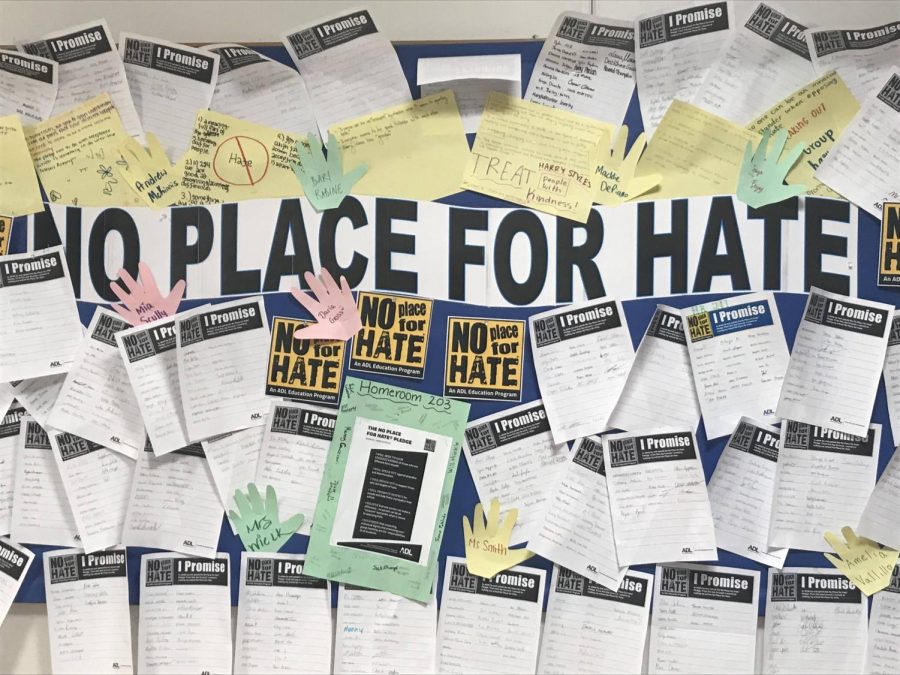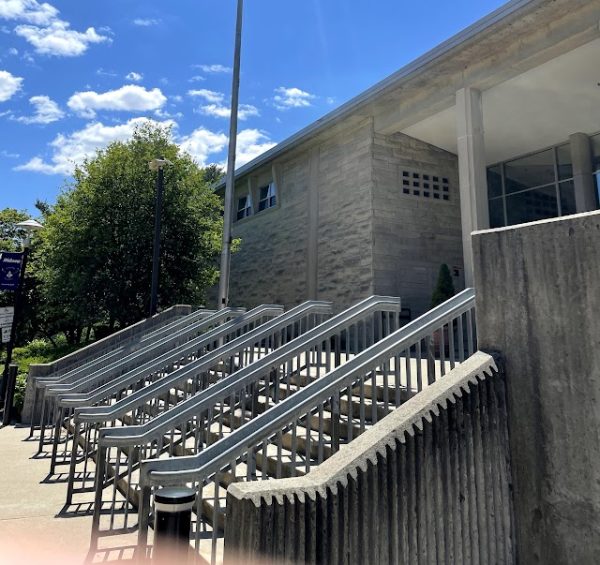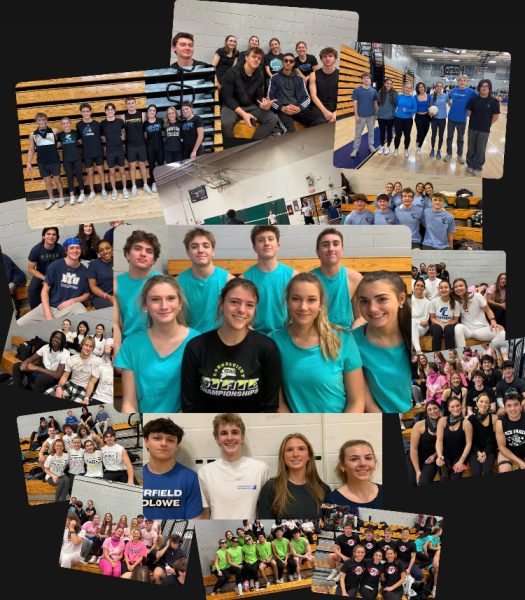Intention to Action: A Conversation with Digna Marte, FPS Director of Diversity, Equity, and Inclusion
District Diversity, Equity, and Inclusion Director Ms. Digna Marte is assisting the Warde and Ludlowe High Schools in implementation of the Anti-Defamation League “No Place for Hate” initiative.
As humans, we have a penchant for putting things into boxes—housing developments, classrooms, even fellow human beings. However, this mindset can limit rather than empower. Fairfield Public Schools’ Director of Diversity, Equity, and Inclusion, Ms. Digna Altagracia Marte, is working to change our District initiatives and outcomes by first challenging our mindsets and preconceptions.
When asked to describe her vision in this role, Marte shared, “I see equity as a way of putting on glasses, taking a second look at everything we do and ensuring that Diversity, Equity, and Inclusion is a part of that work.”
Marte first joined Fairfield Public Schools (FPS) as a world language teacher and returned for this new position in November 2021. Marte has a divergent educational experience with graduate degrees in regional planning, divinity, and business administration. She also comes with robust experience in school leadership, having served as the Principal of Bulkeley High School in Hartford, the Assistant Principal of James Hillhouse High School in New Haven, and the Assistant Principal of the Luis Munoz Marin School in Bridgeport.
While Marte finds her current field of educational leadership empowering, she does not begin her own story with her shift to that field. Growing up in a multilingual household in Washington Heights, NY, is what first empowered Marte to cross barriers of language and culture. Retaining some of her parents’ heritage from the Dominican Republic while immersing herself in the English language that surrounded her outside of the Heights, Marte straddled both cultures with a mindset of curiosity. To Marte, representation was deeply personal: her maternal aunt was the first woman and person of color to graduate from the Pratt Institute’s engineering program, a trailblazing chemical engineer who inspired Marte toward higher aspirations.
While Marte has a background in architecture, she perceives her current role as a facilitator rather than the architect of change. Marte works closely with the FPS Central Office as well as the leadership from each of the buildings. She guides the District Equity Team, composed of administrators, and also supports the Equity Teams at each school, which have representation from students and faculty.
Marte has engaged in a listening tour across the District in order to identify existing initiatives and infrastructure. Fairfield Ludlowe welcomed her on January 27 and 28 to support students in facilitating the “No Place for Hate” programming on Intentional Aspects of Respect, a new commitment that has grown from FPS’ continued work with the Anti-Defamation League (ADL). In addition to her interactions with students, teachers, and administrators, Marte coordinates faculty training on topics such as LGBTQ inclusivity and is contributing to the development of the 2022-2027 District Improvement Plan. The District Improvement Plan provides the District with accountability in lowering the achievement gap and incorporating Social and Emotional Learning (SEL) into the student experience, among other academic and climate objectives.
Marte’s answers were oriented not just toward initiatives or action, but also toward intentional reflection on the nature of Diversity, Equity, and Inclusion (DEI). She spoke of courageous conversations that challenge our top-down perceptions of the world. She validated the belief that transformation lies in unpacking one’s sense of judgment and being receptive to new perspectives. We can grow through conversations together even if we do not think alike. SEL and inclusion are two facets of a common endeavor, working through the origin of complex emotions and defense mechanisms that can inhibit open dialogue. Empathy allows us to interact with others on a different continuum of experience. Marte notes, “We’ve been conditioned to put human beings into boxes. It is difficult to ask people to remove those boxes and start with a clean slate for each conversation.”
Marte shared her perspective that the District is reaffirming its commitment to Diversity, Equity, and Inclusion from an existing foundation of initiatives rather than a blank slate. “I consider myself optimistic,” Marte stated at the beginning of our conversation. Marte celebrates the ongoing high school partnership with the ADL while identifying areas to build on this programming; she acknowledges the rights and liberties guaranteed to American citizens even as she is cognizant of how far we have to come in the journey. Students across the District, especially those connected with the middle and high school student organizations—Beloved Community, Youth for Equity, Gender and Sexualities Alliance and Voices for Equity—deeply inspire her, as they have articulated their viewpoint on the recent African American/Black and Latino/Puerto Rican Studies course proposal and raised their voices in student-led assemblies and forums.
Marte comes to FPS during a unique time, as she reflects that the pandemic has unearthed the experiences of people of color across our country. Outside of education, she has noticed the entertainment industry, workplaces, and government institutions becoming more intentional about DEI. “The awareness has changed,” she shared with me. Representation, whether that constitutes a 30-second commercial or communities being included as stakeholders in policy, impacts the lens with which students see themselves.
“We’re living in a very organic world that is not as concrete as it was before,” Marte continued.
As a large part of Marte’s role focuses on creating recommendations for the District Improvement Plan and collaborating on policy with many stakeholders, much of our conversation centered on the sustainability of these district-wide efforts. Marte views multi-grade programming and initiatives as an asset, because what students learn at the middle school level can build momentum and translate to their high school engagement. Through her collaboration with the Equity Teams, she can adopt a model of “training the trainer” where she passes down her knowledge and training to the equity stakeholders at each school. The District Improvement Plan, reviewed on a regular basis, can function as a commitment to build change incrementally. As with every facet of DEI, self-awareness and reflection is critical. Marte has identified her passion area, which gives her momentum for the work ahead. She spoke, “If I don’t give people energy and motivation to do the work, it becomes very draining.”
Marte encourages students not to limit themselves to one discipline or subject area, as her divergent curiosities in college allowed her to pivot throughout her graduate and professional career. She believes that learning is fluid and deeply empowering. Our prior experiences and conversations do not just define our past; they also give us the tools and lens for today. She sees education as an opportunity to empower students in becoming the next generation of changemakers. In Marte’s work as principal of Bulkeley High School, she pioneered a Leadership in Public Service Pathway, empowering students to view education as a “field of intent.”
Indeed, I saw the aspect of intentionality reflected in Marte’s words and in the “No Place for Hate” assembly that coincided with our interview. Students shared their hopes and commitment to moving FPS from intention to action, as we discussed what disrespectful and respectful schools look like on a continuum. Like Marte’s efforts with the District Equity Team, becoming certified as a “No Place for Hate” school is a multi-stage process. Ludlowe began by forming a committee, with a current membership of 23 students and 9 faculty, which meets regularly to plan implementation. In a December advisory, Ludlowe homerooms signed the “No Place for Hate” pledge to unify the community along shared goals of allyship and combating bias and bullying. The Intentional Acts of Respect assembly is only the first step in conducting activities and advisories to change school climate, but many students have already contributed their visions in moving our school closer to “the ideal respectful, welcoming, and equitable school.”
Fairfield Public School is fortunate to have Digna Marte as a liaison for DEI as we bridge intention into action. Marte concluded, “Policies won’t represent the communities they are designed to represent and will still be gatekeepers if we don’t do the work of reflecting first. We will still be conditioned by the systems in which we have grown.”
As she looked ahead, Marte left me with this vision: “We have to focus not just on our work to get to the next level, but also ensuring that we are not leaving others behind.”

Harper is the current Editor in Chief of Prospect. Harper served as the Opinions Editor of the paper during the 2019-2020 school year. This is her fourth...











